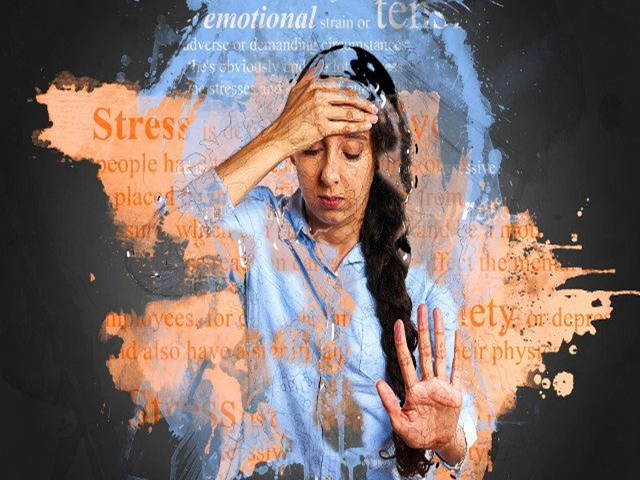
Anxiety can be a normal reaction to stress which can be described as a feeling of worry. Many people get nervous when facing a problem or challenge at work, before going for an interview, or exam, or before making an important decision in life.
A certain amount of anxiety is normal. Anxiety is nothing but anticipation of a future concern and is more associated with feelings of nervousness, avoidance behavior and tension in the muscles. It can be beneficial in some situations as it alerts us, and allows us to avoid or fight dangerous situations.
Anxiety neurosis
It is an extreme form of anxiety compelling the person intensely worried .it is the combination of anticipation ,anxiety , apprehension ,fear phobia ,distress ,worry , stress ,uneasiness ,restlessness and compulsiveness etc .
Anxiety disorder or neurosis needs medication or treatment when it is out of control.
Pathology of anxiety disorder or neurosis
Neurotransmitters in our brain are responsible for controlling balancing and different emotions. Some of the neurotransmitters play a different role in regulating anxiety. Dysregulation of neurotransmitters, such as serotonin, norepinephrine, dopamine, and gamma-aminobutyric acid, is responsible for an anxiety disorder or anxiety neurosis.
Causes of anxiety disorder or neurosis
1) Genetic factors: – A family history of anxiety disorders or other psychological diseases predisposes certain people to develop anxiety disorders.
2) Psychological factors:– People having low self-esteem and poor coping skills while dealing with different life situations are more prone to suffer from anxiety disorders. This basic nature of an individual makes them vulnerable to anxiety disorder.
3) Environmental or social factors: – Life experiences, such as the death of a loved one in the family, a financial loss, divorce , uncertainty in job or loss of job, accident or major illness, and a long term exposure to abuse, violence, terrorism, and poverty can affect a the person‘s attitude and response to life situations. These situations may make a person susceptible to anxiety disorder or neurosis.
Children growing up in a family where they have seen fear and anxiety as adaptive behavior can make them vulnerable to become anxious & suffers from anxiety disorder or anxiety neurosis.
4) Medical illnesses and use of medicines:– Certain medical illnesses, such as hormonal disorders, respiratory diseases ,heart diseases or neurological disorders may cause the symptoms of anxiety disorders. The use of certain medicines or drugs may lead to symptoms of anxiety disorders. Hormonal treatment or therapy and drugs, such as amphetamines, corticosteroids, bronchodilators, contraceptive pills, sleeping pills, etc. may lead to anxiety disorders or anxiety neurosis.
4) Imbalance of neurotransmitters: – Imbalance of neurotransmitters, such as serotonin, norepinephrine, dopamine, and gamma-aminobutyric acid, is responsible for an anxiety disorder or anxiety neurosis.
Common sign and symptoms of anxiety disorder or neurosis
- Feeling nervous, restless or tense.
- Trouble concentrating or thinking about anything other than the present worry.
- Having a sense of impending danger, panic or doom.
- Feeling weak or tired.
- Having an increased heart rate.
- Breathing rapidly
- Sweating.
- Trembling.
- Fear of approaching of anything new
- Weakness and lethargy
Physical symptoms
- Dryness of mouth
- Difficulty in swallowing
- Rapid breathing or difficulty in breathing
- An increased heart rate or palpitation
- Hot flashes
- Trembling of extremities
- Sweating
- A headache
- Nausea or vomiting
- Diarrhea
- Fatigue
- Muscle tension
Emotional symptoms
- An intense feeling that something harmful is about to happen
- Excessive worry in an everyday situation
- Nervousness
- Restlessness
- Feeling on edge
- Irritability
- The anticipation of a threatening event or situation
- Sleep disturbances
- Strong desire to avoid social situations or things that trigger anxiety
Cognitive symptoms
- Difficulty in concentrating
- Fatigue
- A lack of clarity while taking a decision
- Memory problems
- Difficult perception of surroundings
Types of anxiety disorder
- Generalized anxiety disorder :- Generalized anxiety disorder is characterized by excessive, unreasonable anxiety and worry about day-to-day activities or events.
Common symptoms :- Activities, such as daily work, study, performance, day-to-day events, Nervousness and restlessness in trifles ,Irritability, Difficulty in concentrating ,Sleep disturbances ,Fatigue
- Specific Phobias :- If there is an excessive persistent irrational fear about some specific object or situation such as the fear of animals, height, fire , water, closed places, going to elevators, crowded places, fear of blood, injections, accidents etc., then the anxiety disorder is termed as a specific phobia. In such conditions the patient often tries to avoid that specific object or situation.
- Social phobia :- Patients with Social Anxiety Disorder have an excessive and persistent anxiety or fear in one or more social situations. A person suffering from a social phobia will avoid or will be extremely distressed in social meetings, parties etc. The patient may experience common symptoms like fear of the crowd, Fear social gatherings, constant fear of negative evaluation by others, Inferiority complex, feeling of suffocation, sweating, diarrhea, excessive urination and rapid heart rate in social situations.
- Acute anxiety disorder:- Acute anxiety disorder is caused by recent exposure to a stressful or traumatic life event. The patient often presents with the feeling of intense fear, helplessness, or horror. This interferes with the daily routine of the patient. After such an event, the patient experiences the feeling of emotional numbness, reduced awareness or no awareness about what is happening in the surroundings, Irritability, Restlessness, Difficulty in concentrating, Sleep disturbances etc .
- Obsessive-compulsive disorder (OCD ):- Patients suffering from obsessive-compulsive disorder are continuously occupied with persistent anxious thoughts and they do repetitive actions .Commonly seen Repetitive behaviors are washing hands, ordering, checking locks and doors repeatedly, etc. The patient feels the impulse to repeat these actions and to perform them to relieve the anxiety.
- Panic attack:- It is characterized by sudden attacks of terror accompanied by a rapid heart rate, sweating, hot flushes , weakness, fainting or dizziness, chilliness, tingling and numbness of hands, trembling of hands, etc. The patient may experience chest pain, nausea, choking sensations in the throat , palpitation and difficulty in breathing etc . Panic attacks usually lead to a sense of unreality, an impending fear or a fear of losing control. He avoids the situations that may provoke a panic attack. The duration of a panic attack may vary from a few minutes to hours.
- Post-traumatic distress disorder:- Post-traumatic stress disorder (PTSD) is developed after exposure to a traumatic or frightening life event common symptoms are Intense fear or anxiety about the same event or incidence will repeat ,feeling detached or numb ,sleep disturbances , loss of interest in activities etc .
Role of Homeopathy in anxiety disorder or anxiety neurosis
The prescription of homeopathic medicine for anxiety neurosis is based on the principle of individualization. At Savi Homeopathic clinic , during case-taking, the patient’s basic nature, his mental state, symptoms of anxiety neurosis, his stress coping mechanisms, childhood situations, family environment in childhood, family history, past medical history, and his social, personal, and professional relationships are taken into consideration and a detailed analysis is done before prescribing the medicines. Hence, homeopathic medicines act at a deeper level and help to treat the disease from its root. Initially, if the patient is taking conventional treatment, he has to continue those medicines, as stopping them suddenly may cause withdrawal symptoms.
With the regular use of homeopathic medicines, gradually, the need for conventional medicine (anti-anxiety, antidepressant medicines, and sleeping pills) gets reduced. Over a period, one may be able to reduce the dose or stop the medicines under the guidance of an expert doctor.
Homeopathy is a completely safe treatment and it does not have any side-effects.
Homeopathic medicines give relief to the patient in an anxiety state. They reduce the frequency, duration, and intensity of panic attacks. Homeopathy improves the sense of well-being and sleep. Homeopathic medicines are non-habit-forming and the use of homeopathic medicines does not lead to drug dependency.
Preventive measures
- Take care of your body by eating a well-balanced diet.
- Think positive.
- Limit alcohol, caffeine, and sugar consumption.
- Take time out for yourself every day.
- Avoid activities you don’t find relaxing.





